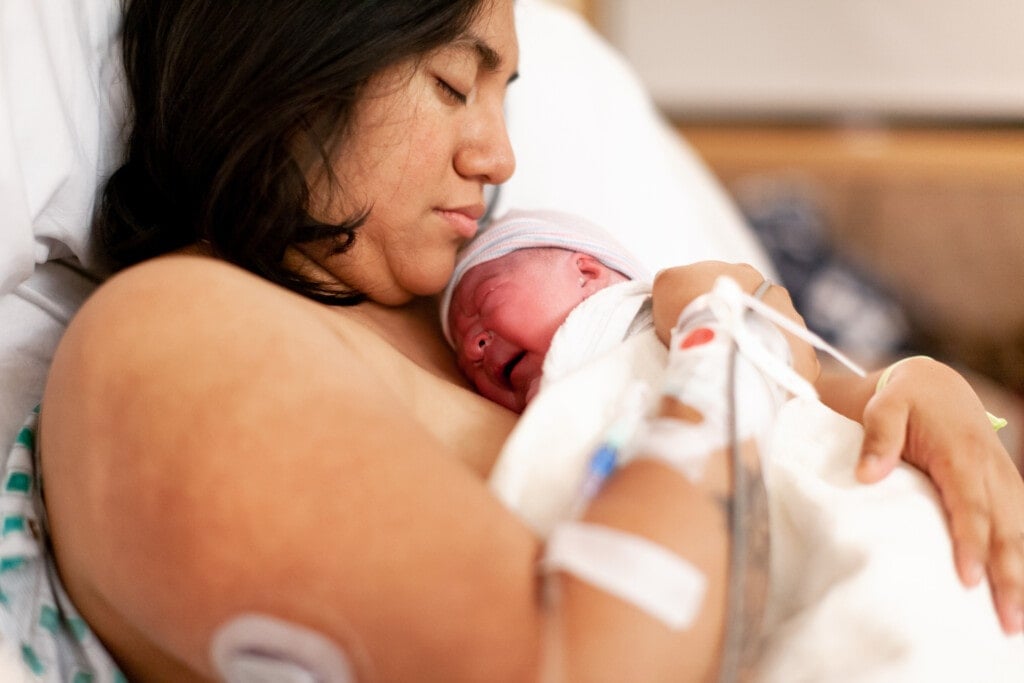Having a baby is one of the few events that change your life forever. The postpartum care period of pregnancy, sometimes called the fourth trimester, extends from the birth of your baby to 12 weeks.9 After giving birth, a woman goes through emotional, mental, and physical changes as her body returns to a pre-pregnancy state. Postpartum care should be a priority for all women; it comes with its own dos and don’ts. Let’s dive into some things to avoid after giving birth.
Postpartum Care and What Not to Do After Giving Birth
When a new baby arrives, family adjustments soon follow. Women, however, carry a different load; no matter how much support you have, your body needs to heal, and that’s where postpartum care comes in. The following list includes things NOT to do after giving birth, considering your physical, mental, and emotional health.
1. Don’t Have an Open-Door Policy
Something about the birth of a new child brings all your friends and family out of the woodwork. However, laying some ground rules and limiting long calls and visits is a good idea during those first few days to weeks postpartum. You need to rest, too, and you may be establishing breastfeeding. It is okay to keep interactions brief during this time because participating in long conversations or staying awake when you could be resting can lead to exhaustion.
2. Don’t Avoid Pain Medications
Some moms worry about taking too much pain medication after giving birth. They may worry about transferring medicine to the baby via breast milk or feeling groggy. While some women may not need pain medication, others who have experienced a tear, episiotomy, C-section, or traumatic birth may find pain medicine to be their best friend for a while.
Staying on top of your pain is an essential part of postpartum care. When women forgo pain medications, the intensity can complicate recovery, making it unbearable to move.2,3,8,10
Your healthcare provider will typically discuss pain management before hospital discharge. Staying on top of scheduled medication doses during those first few days can positively impact your healing.
3. Don’t Skip the Stool Softeners
For many women, having a first bowel movement after giving birth is scary, and doctors frequently recommend a stool softener to ease passing stool postpartum. Prune juice and walking also help get the bowels moving. Milk of magnesia may help if you have yet to pass a stool by day three or four.2,3,8
4. Don’t Do Any Heavy Lifting
The rule of thumb in postpartum care is not to lift anything heavier than your newborn for the first several weeks. Heavy lifting increases intra-abdominal pressure. The pressure can cause a C-section incision to open and sometimes pelvic organ prolapse, as well as other complications. Wait until your physician clears you at about four to six weeks postpartum before tackling heavier tasks.3,8,12
5. Don’t Forget To Drink and Eat
When caring for a newborn, hours slip away, and among the things to avoid after giving birth is forgetting to eat or drink.
For proper postpartum care, make a conscious effort to replenish and nourish yourself with healthy options throughout the day. Eating smaller meals may help increase your intake. Breastfeeding mothers need more caloric and fluid intake to maintain milk production. Staying hydrated also helps with constipation. Women should aim for eight 8-ounce glasses of water daily, and breastfeeding mothers need about 16 8-ounce glasses daily.3,8,11,14 Having family and friends participate in a meal train is a welcome idea if you have the support available.
6. Don’t Refuse Help
Accept help from others in your support system. Ask for help with laundry, preparing meals, shopping, caring for other children, and lifting objects. After all, you just had a baby, and getting help with daily tasks will enable you to rest and recover more quickly. Send this article, 15 Things You Should Do for a New Mom, to your friends and family. And share this article, Best Ways Dads Can Help a New Mom, with your partner.
7. Don’t Put Anything in Your Vagina Too Soon
Avoid tampons, menstrual cups, and sex until your physician gives you the okay, typically about four to six weeks postpartum. Inserting anything in your vagina too soon after birth can lead to an infection.3,4,5,8
8. Don’t Be Too Hard on Yourself
Sometimes, there’s pressure on women to do it all, be a superwoman, and bounce back to a pre-pregnancy body immediately after giving birth. These are unrealistic expectations for most new mothers, and trying to achieve perfection can lead to signs of overdoing it postpartum. Taking on too much too soon can deplete you physically, mentally, and emotionally. It puts you at risk for pain, injury, complications, and postpartum depression.2,6 Be forgiving and kind to yourself. Listen to your body, and don’t put too much pressure on yourself to achieve perfection. This season of life is a marathon, not a sprint.
9. Don’t Ignore Your Feelings
Women can experience a roller coaster of emotions after giving birth. Fluctuating hormones and coping with the new demands of motherhood play a role. Learning to care for your baby takes time and patience. Even siblings can have very different personalities. What worked for your first baby may not work for your second. Add sleep deprivation, and both parents can have moments of exhaustion, but mothers have the added challenge of a healing body.
Fluctuating emotions are normal, but if you have prolonged sadness lasting more than a few days, contact your healthcare provider for advice. Postpartum depression affects 1 in 7 women and usually appears about one to three weeks after giving birth. It differs from the baby blues, lasts longer, and may need treatment.2,6,7,8
10. Don’t Skip Follow-Up Appointments
Postpartum checkups are a vital component of postpartum care. Expect to follow up with your OB-GYN within two to three weeks after delivery and again between six and eight weeks postpartum. You should then have a final visit around 12 weeks.2,7,8,9,15
11. Don’t Forget To Discuss Birth Control
During your postpartum checkups, make sure to discuss birth control. It is a myth that women cannot get pregnant during the postpartum period or while breastfeeding. There are many instances where families have siblings less than a year apart.2,3,4,7
12. Don’t Go to the Gym Too Soon
Strenuous exercise, including cardio, core, and weight lifting, may be unsafe postpartum. Talk with your doctor before starting or restarting any exercise program. On the other hand, walking is encouraged; it is gentle exercise, and a short stroll in the fresh air can be refreshing and uplifting.3,8
Foods To Avoid After Giving Birth
Nutritious foods provide much-needed nutrients to help your body heal and produce milk. However, some drinks and foods should be consumed in moderation, such as tea or coffee, because they may affect a breastfeeding baby. But, overall, there are minimal restrictions. If you are breastfeeding, consuming alcohol requires some consideration. It is best to speak with your doctor about alcohol intake first.11,13
What Causes a Setback During the Postpartum Care Period?
Knowing what not to do after giving birth can help mothers heal. But sometimes, despite a mother’s best efforts, setbacks that are out of her control can happen. Examples of things that can cause setbacks postpartum include:1,4,6,7,8
- Pain
- Infection
- Difficulty breastfeeding
- Traumatic, complicated, or emergent birth
- C-section complications
- Having a child in the neonatal ICU
Timeline for Postpartum Care
Postpartum care recommendations change with the passing days and weeks post-delivery. As your body heals and gets stronger, limitations slowly lift.
Can You Take a Bath After Giving Birth?
The answer varies. If you had a vaginal delivery, you could have a bath as long as your doctor says it is okay; however, if you have stitches or a C-section, you may need to wait longer. But talk to your healthcare provider first. Sitz baths are warm, shallow baths that promote perineal healing and provide comfort by easing pain. Sitz baths are typically safe, and you can soak for 15-20 minutes once a day after the first 24 hours after delivery.3,5,8,16
How Long Should You Rest After Giving Birth?
During the first 48 hours after giving birth, you should do little other than rest and feed your baby. During the days, weeks, and months that follow, listen to your body and rest when needed; after all, you just had a baby. Take things slowly; don’t try to do too much too fast.
When Can You Drive After Giving Birth?
To drive, you need to feel like you can react quickly, wear a seatbelt comfortably, and be alert. For this reason, the length of time to abstain from driving after a vaginal or C-section birth may vary. Speaking with your doctor before getting back behind the wheel is best.
Postpartum Symptoms Not To Ignore
Women are at risk for developing complications postpartum, even if they have an uncomplicated pregnancy and birth. The following is a list of postpartum symptoms not to ignore, and some can be life-threatening. Make sure to seek medical attention if you experience any of the following symptoms:1,2,3,4,6,8
- Severe pain or cramping
- Increased bleeding or passing of large clots
- Sore, red, warm breasts or nipples
- Problems with breastfeeding
- Severe headache
- Blurred vision
- High blood pressure
- Shortness of breath
- Chest pain or leg pain
- Fever
- Incontinence
- Problems with C-section incisions, episiotomies, or tears
- Feeling like you may harm yourself or your baby
- Prolonged feelings of sadness
The postpartum care period is a special time when you finally meet your baby, full of beautiful moments. Take time to rest and recover, seek medical advice when needed, and enlist help from your support system. Your baby needs you to be the healthiest, strongest version of yourself.











